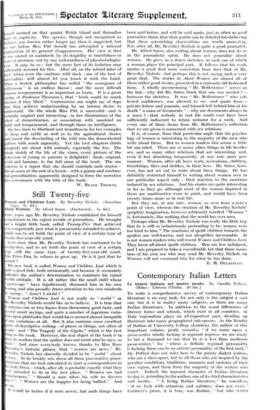Still Twenty-five
bout Women. By Alfred Sutro. (Duckworth. 7s. 6c1.)
OME years ago Mr. Beverley Nichols established for himself reputation as the enfant terrible of journalism. He brought ta a bright little book called Twenty-Five that achieved 'ery competently just what it presumably intended to achieve, -Welt was to set forth the point of view of a certain type of wenty-five-year-old mind.
Ever since then Mr. Beverley Nichols has continued to be venty-five, and to set forth the point of view of a certain_ vpe—still the same type—of twenty-five-year-old: mind.
ike Peter Pan, he refuses to grow up. Or is it just that he annot ?
His new book is called Women and Children Last which is uite a good title, both intrinsically and because it accurately dieates the author's determination to maintain_ his enfant rrible attitude. It is all rather like the small child whose
grown-ups ' have injudiciously discussed him in his own caring, and who proudly draws attention to his own misdeeds saying : "Aren't I awful ? "
Women and Children Last is not really as " awful " as Ir. Beverley Nichols would like us to believe. It is true that
contains one or two lapses from elementary, good taste, and vend smart sayings, and quite a number of ingenious varia- ions upon platitudes that would have seemed almost incapable any variations at all. But it also contains some excellent ems of descriptive writing—of places or things, not often of eople --and "The Tragedy of the Gigolo," which is the best
liing in the book. However, the real object of the book is to how its readers that the author does not mind what he says, so
mere! And since everybody knows, thanks to Miss Rose lacaulay's historic phrase, that "women are news," Mr. leverley Nichols has shrewdly decided to be " awful " about °men. So he briskly sets down all those provocative gener- Nations that are best calculated to start a correspondence in
daily Press—which, after all, is probably exactly what they 'ere intended to do in the first place. "Women are bad
"mekeepers," "Should a man allow his wife to divorce
'"1 ? " "Women are the happier for being bullied." And ' on.
It would be better if it were newer, but such things have
been said before, and will be said again, just as often as good journalists think that their public can be deluded into believing that these astonishing observations are worth answtri ig. For, after all, Mr. Beverley Nichols is quite a good journalist.
Mr. Alfred Sutro, also writing about women, does not do so in the journalistic spirit. He does not generalize about women. He gives us a dozen sketches, in each one of which a woman plays the principal part. It follows that his work carries a good deal more conviction than does that of Mr. Beverley Nichols—but perhaps this is not saying such a very great deal. The stories in About Women are almost all of them rather good stories, presented in a curiously old-fashioned form. A wholly unconvincing "Mr. Mollentrave " serves as the link—why did Mr. Sutro think that one was needed ?- between the sketches. It was "Mr. Mollentrave " who col- lected confidences, was allowed to see—and quote from— private letters and journals, and himself left behind him at his death" a mass of documents "—why are documents always in a mass ?—that nobody in real life could ever have been sufficiently indiscreet to retain unbunit for a week. And every one of those items from Mr. Mollentrave's collection that we are given is concerned with sex relations.
It is, of course, from that particular angle that the psycho- logy of women is interesting to the majority of the men who write about them. But to women readers this seems a little bit one-sided. There are so many other things in life besides sex, and so many other relations that are interesting, and', even if less absorbing temporarily, at any rate more per- -manent. Women, after all, have work, recreations, children, -friendships, likes and dislikes, in their lives. Mr. Sutro, how- ever, has not set out to write about these things. He has definitely restricted himself to writing about women seen in one particular aspect only : their reaction to the emotions induced by sex relations. And his stories are quite interesting so far as they go, although most of the women depicted in them are unattractive even in print, and would have been twenty times more so in real life.
But they are, at any rate, women, as seen from a man's point of view, whereas the creation of Mr. Beverley Nichols' sprightly imagination, however arbitrarily labelled "Woman '! is, fortunately, like nothing that the world has ever seen.
Perhaps when Mr. Beverley Nichols was really the little boy that he is still so industriously pretending to be, women were too kind to him. • The reactions of spoilt children towards the spoilers are well-known, and not altogether inexcusable. It is not women readers who will resent Women and Children Last. They know all about spoilt children. Men are less indulgent, and I am prepared to take a considerable bet that those mem- bers of his own sex who May read Mr. Beverley Nichols on Women will not commend him for what he has done.
E. M. DELAVIE1,1).














































 Previous page
Previous page